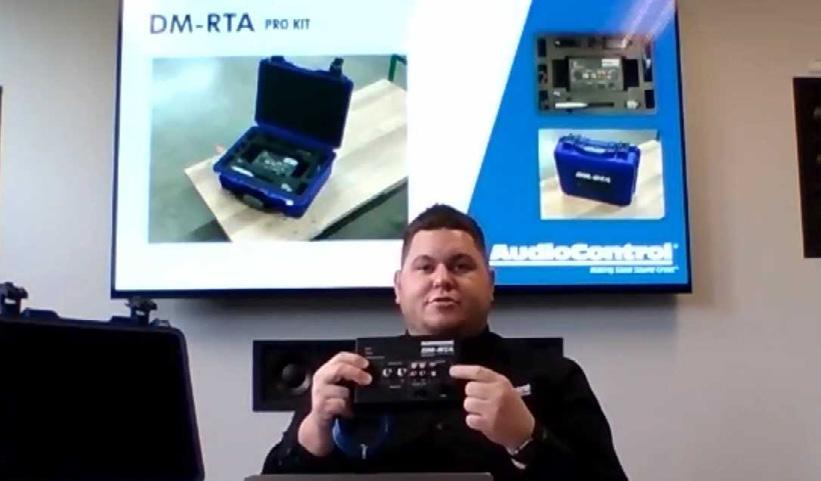
8 minute read
The Evolution of Industry Training
As training evolves due to ever-changing product technology, the COVID-19 pandemic makes its own impact on how professionals stay educated. Here’s how businesses are adjusting by shifting perspective.
WORDS BY ROSA SOPHIA
At the tail end of this past year, things had yet to change. Before the Coronavirus pandemic, this feature was intended to look at how training has evolved and how more isolated businesses gain access to education if they can’t make it to a distributor show or an event like KnowledgeFest. When the global pandemic began, Mobile Electronics magazine and MEA shifted focus to offer resources. While MEA has offered weekly webinars, as well as manager and owner roundtable discussions online, manufacturers have also shifted perspective to bring online education to retailers everywhere.
The Changing Landscape of Training
Jeff Cantrell of Jackson Car Audio in Jackson, Tenn. recalled the last faceto-face training hosted at his facility in November—a class on the Business of DSP with Ken Ward of Educar. The class was sponsored by Audison, AAMP, AVR Distributing, Sony, NAV-TV, K40, Harman and Scosche.
“This class was a mix between teaching the install side of DSP, what happens on the front end and the sales floor, and how to teach staff to work together to make sure we’re selling the customer the right thing,” Cantrell explained. “It was about 25 percent focused on sales, and about 75 percent on installation.”
Communication between the front of the store and the back was a main discussion point. “I think people struggle with
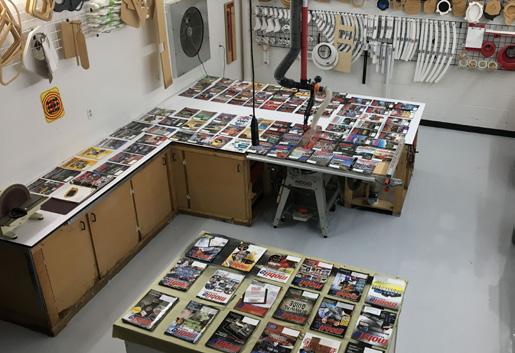
One of the highlights of the November training at JC Audio was the “History of Mobile Electronics magazine,” a dedicated area in the fab room where attendees enjoyed flipping through previous issues.
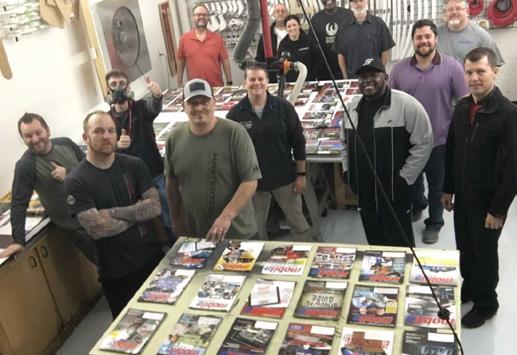
One of the highlights of the November training at JC Audio was the “History of Mobile Electronics magazine,” a dedicated area in the fab room where attendees enjoyed flipping through previous issues.
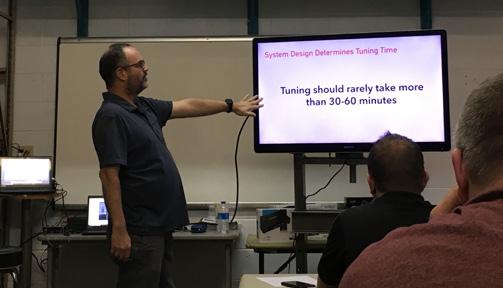
selling DSP,” Cantrell said, adding that some salespeople likely have difficulty because they are not familiar enough with the product. “We decided to address both sides. I think the more we look at both sales and installation, the better things will be when it comes to selling any product.”
About 13 students attended the class. Past classes held at the facility have been led by Ray West and Jason Kranitz. Cantrell feels that additional educational opportunities have instigated a huge change in the industry, pushing many shops to produce higher quality work.
“I don’t remember as many trainings when I was coming up in the industry. We relied on manufacturer reps to provide training,” he added. “That was back in the 90s and early 2000s.”
Cantrell’s facility began hosting trainings because the local area doesn’t offer much in terms of industry education. “We have the option of Mobile Solutions in Arizona, and Kingpin University in Nevada. No one does anything here, so we are meeting a local need,” he said. “We’ve had people from Chicago, Texas and Mississippi. Attendees aren’t usually local.” The shop hopes to host more trainings in the future.
Currently, many of the trainings that would have taken place in-person are now being held online. Since that training took place in November, Cantrell said his shop has stayed open during the spread of COVID-19. “We locked the door and began allowing only one person at a time inside. We are also doing a lot of estimates over the phone and email. It’s actually been pretty good,” he said, adding that revenue had increased 10 percent in April from the previous month.
Online Education Opportunities Increase Due to COVID-19
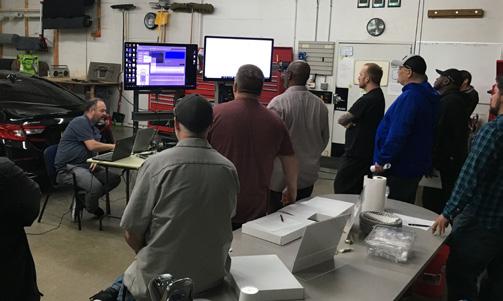
Since businesses began closing and stay-at-home orders went into effect in various parts of the country, Ken Ward of Educar has offered some online training. “We have been releasing online courses and preparing online courses for release that we hadn’t spent much time on before all of this,” Ward explained. Segments of courses are being released as free previews for those shops who may not have money to spend on paid trainings.
Ward said the recently released Basics of Sound and Audio course has received positive reviews, and is offered at a reduced cost during the pandemic. “Kicker featured it on their social media page for dealers and enthusiast consumers,” he added. “That was a nice compliment. Surveys tell us the next course customers are interested in is OEM integration.”
While Ward has had less of a response to online courses, manufacturers such as AudioControl have experienced a
surprising amount of international interest. Chris Bennett, director of sales at AudioControl, said the international attention was completed unexpected. “We were trying to reach our domestic dealer base,” he said, adding, “but it’s been great for international installers, too.”
He noted that the company’s live trainings on Zoom have garnered between 65 to 100 participants each time. “It’s all free. This is our eighth week of online trainings. We’ve kept it at the same time, and a lot of people have commented on them.” While the trainings take place on Zoom, he said, they’re also added to Facebook. “On Facebook, our trainings have 20,000-plus views,” he added. “With that kind of viewership, we’re keeping it open to consumers as well.”
Those who are interested in the training videos can find them on AudioControl’s Facebook page. While AudioControl has done some webinars in the past—mainly to walk dealers through a product line—Bennett said these training sessions are unlike anything they’ve ever done on the Internet. “Now we’re getting into how to tune systems, how to use DSPs and how to use our line output convertors,” he said, adding that it was something the company already wanted to do, but hadn’t had time for until the pandemic began.
Being in Seattle, Bennett said AudioControl was impacted greatly by the pandemic. “Chris Kane was somewhere around the one-thousandth person in the U.S. to test positive, and he oversees our home audio,” Bennett explained. “It seriously impacted us. It was surreal and scary.”
How Will the Industry Adjust to the New Normal?
Everyone has a different idea of what “the new normal” refers to. In the 12-volt industry, the way retailers interface with customers has already changed in the wake of the pandemic.
“It’s only because of this crisis that we’ve been able to sit down and put this together,” Bennett said. “It’s given us time to do what we wanted to do years ago. The only thing I can compare the Zoom trainings to is KnowledgeFest, when we can get about 100 people in a classroom.”
Both Bennett and Ward stated that the impact on business has been different depending on geographical placement of 12-volt shops and facilities. “Some shops have been forced to close down,” Bennett said. “Employees are often like family. For a retailer who has four employees in a shop, it’s heartbreaking to let two or three or all of them go because you just don’t know what’s going to happen next.”
AudioControl revenue is up a bit, he added. “We’re not where we want to be, but our numbers are increasing. We haven’t been as impacted as we anticipated six weeks ago, which is a huge blessing, and I think a lot of dealers are also ramping back up over the last few weeks and starting to see new business.”
Ward said he’s heard stimulus payments are beginning to help. “Shops that are open are busier than they’ve been all year,” he said. “We have a big disparity between those who have nothing to do or are officially furloughed, and the folks who have more to do than ever.” Those who are too busy may not be participating in online trainings.
JC Audio handles much of its training in-house. “There are only three of us on staff, which is part of the reason why I try to bring someone in to do a training,” he said. “That way, we don’t have to close down the store and drive eight hours to an event.” At the end of these in-person classes, students take a quiz to test their knowledge. “The results are used to determine the main prize,” Cantrell explained. “When we do these trainings, everyone goes home with something because of the sponsors providing goods for prizes. In November, students went home with a workbook and educational handouts.”
Online Trainings Continue to Offer Convenient Educational Options
Since the pandemic began, Cantrell said it’s been nice having access to more online trainings and meetings than usual. “They’re very convenient,” he said, adding, “I hope they continue after everything is back to normal.” The value of in-person networking, however, can’t be underestimated.
As part of the event in November, Cantrell featured a “History of Mobile Electronics magazine” in the shop’s fabrication area so students could flip through the print issues and see how the industry has evolved year over year. Additionally, participants enjoyed a visit to Rusty’s TV and Movie Car Museum, and then attended a Sony-sponsored dinner.
Ward said he will be releasing additional online training soon. “I’m hoping to release the biggest course we’ve done so far,” he said, adding, “It’ll probably be about three KnowledgeFest classes worth of content.”
Under ordinary circumstances, Bennett said that AudioControl trains between 1,600 and 5,000 people at faceto-face events throughout the year.
While there are still some shops that fail to take advantage of training events—regardless of proximity—Bennett believes increased online education will continue post-pandemic, which could help meet needs in areas of the country that have less access to face-toface trainings.








